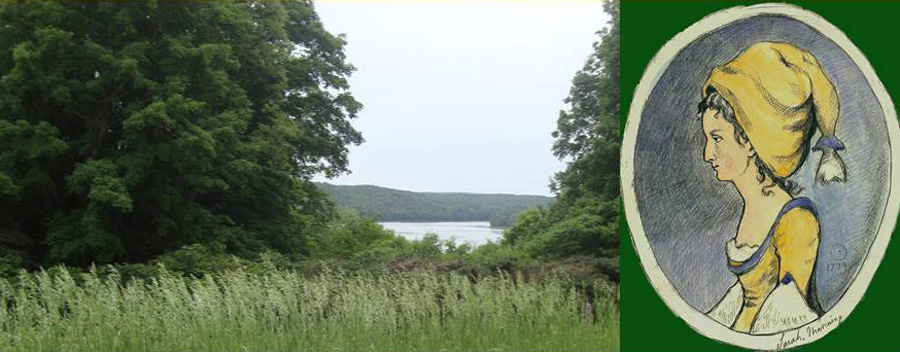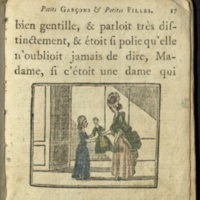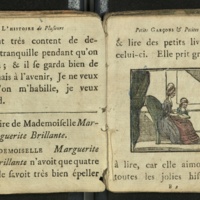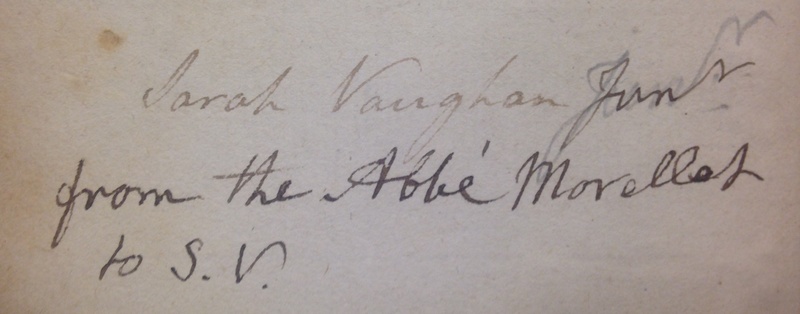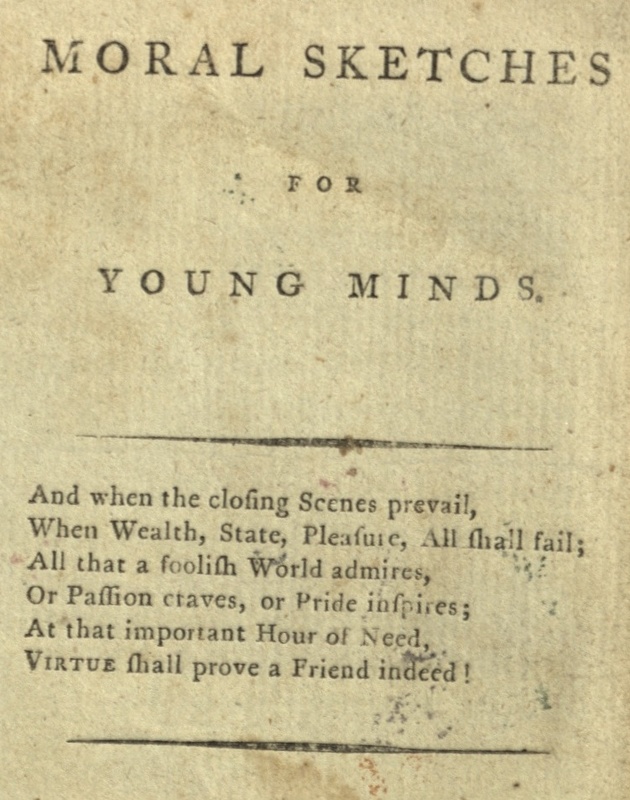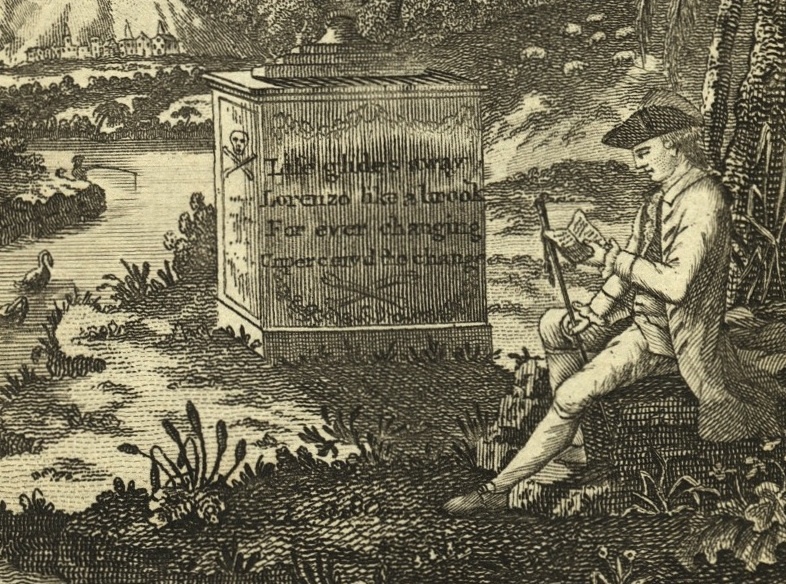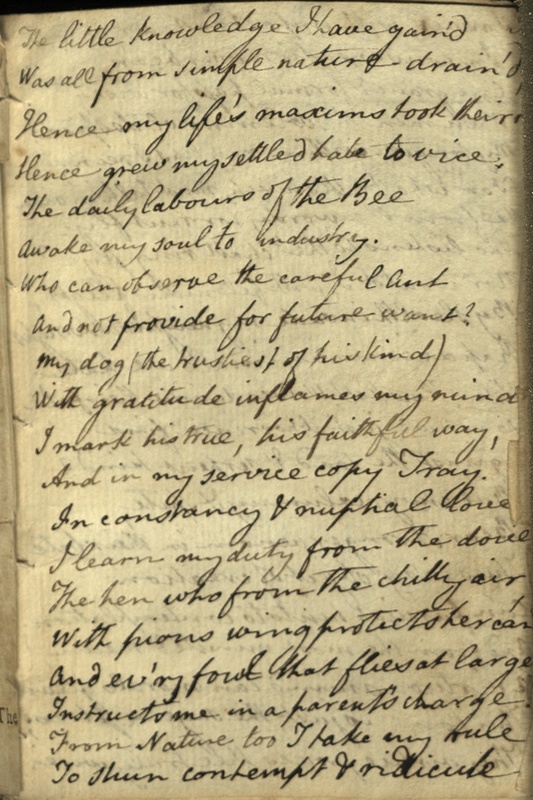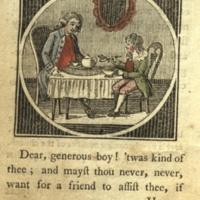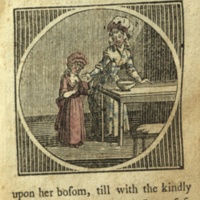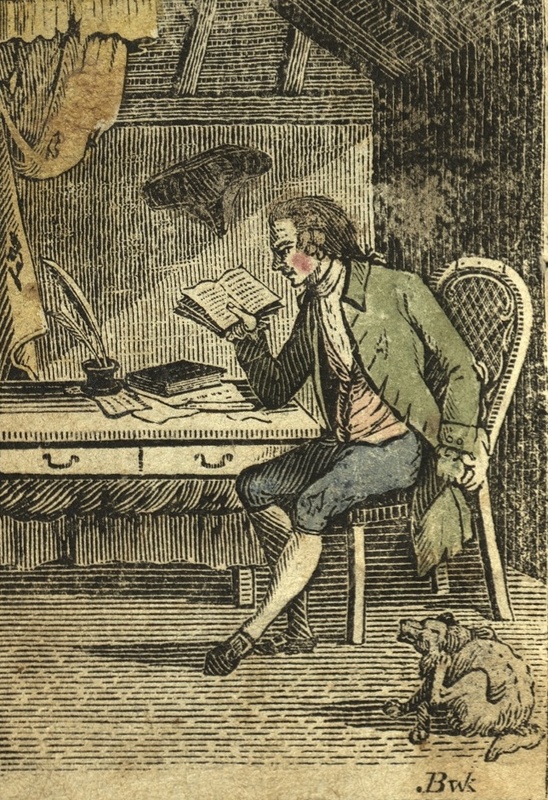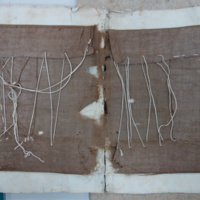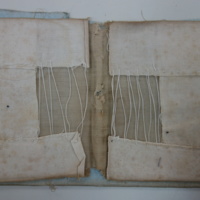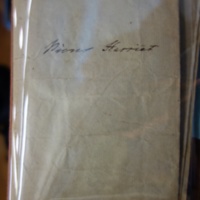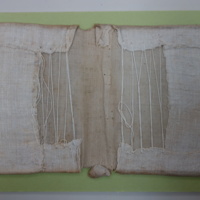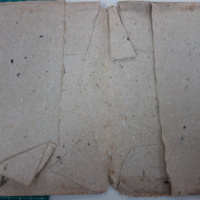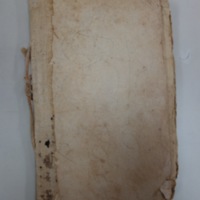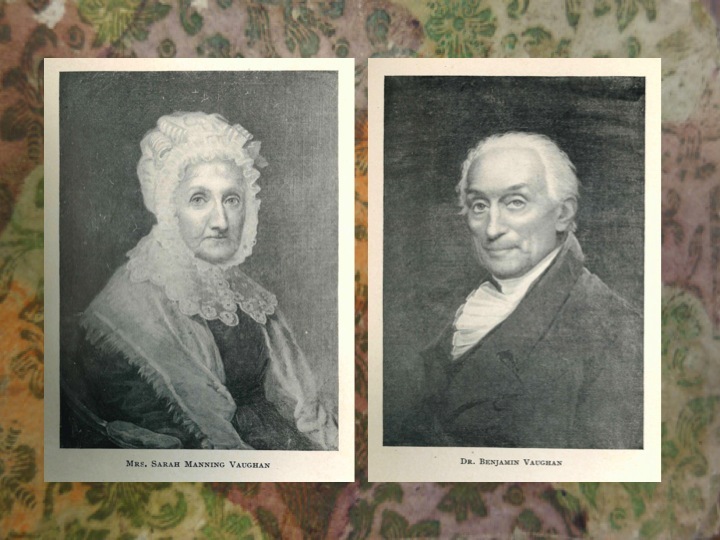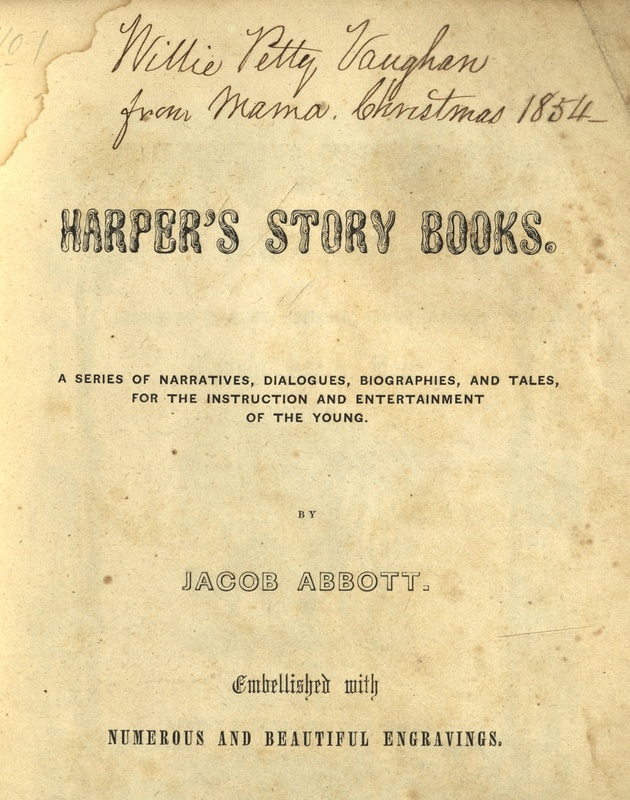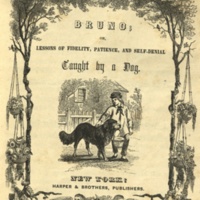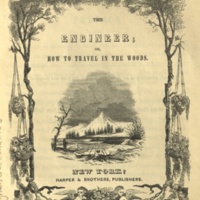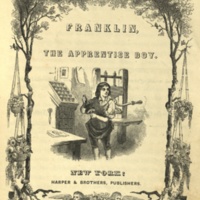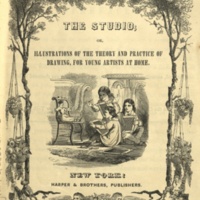Sarah Vaughan's Lending Library
“The manifest design of learning is, either to render a man an agreeable companion to himself, or a useful member to society; to teach him to support solitude with pleasure, or to pass through promiscuous temptation with prudence; to assist him in managing an estate, if born to one; or if not, to furnish him with the means of acquiring one. A person who applies himself to learning with the first of these views, may be said to study for ornament; as he who propose to himself the latter, properly studies for use.”
The Amusing Instructor: or Tales and Fables in Prose and Verse, For the Improvement of Youth, 1777
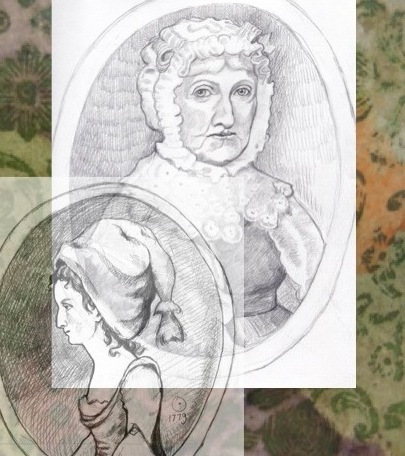
Sarah Manning Vaughan portraits, age 26 and 76, against a background of Dutch floral brocade, by Tara McGowan.
As Sarah Manning Vaughan transitioned from the role of mother to that of grandmother, her activities in the community expanded beyond her immediate family. She could frequently be seen traveling around Hallowell in a horse and cart to distribute food, clothing, and, of course, to lend out books.
In her obituary in the Hallowell Gazette of 1834, Sarah was remembered particularly for
...that habitual kindness which always prompted her to relieve distress and to promote the happiness of those around her--and the pleasure she took in personally administering to the comforts of others during a long life...Allied to this beneficent disposition, was the deep interest which she took in youth and children--in their education--in their pleasures and morals. This was not confined to children of her friends, though they were in the way to receive more constantly the tokens of her kindness, but extended to all who came within the range of her acquaintance.
The Vaughans chose to live simply and to avoid signs of ostentation, but they did send their children at regular intervals to England to stay with relatives and to learn about the wider world. Sarah and Benjamin, for their part, never returned to England, much to the sadness of their family and friends, particularly the Marquess of Lansdowne, who had always viewed Benjamin as a surrogate son.
People of the World, but not Worldly
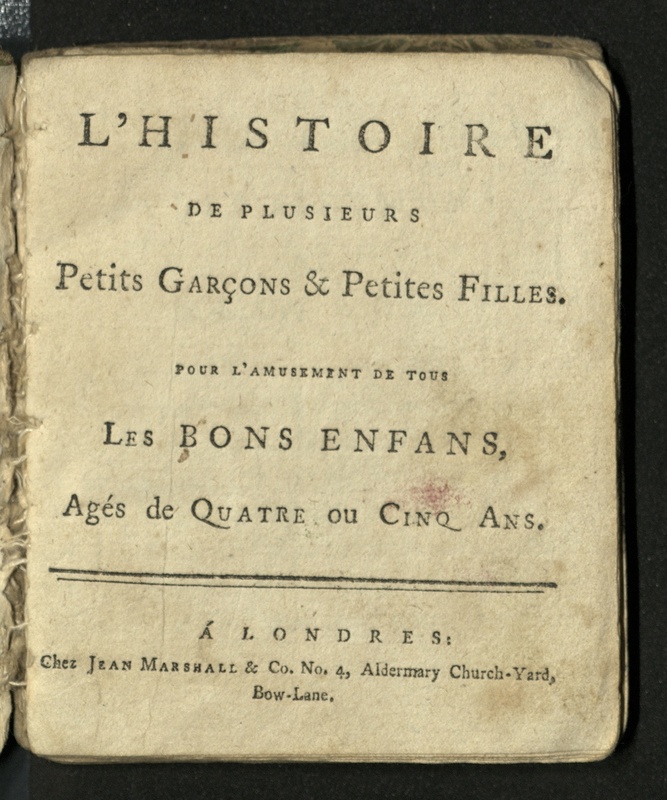
One of the many children's books in French in the Vaughan collection, this volume is distinctive for having been hand-colored, probably by one of the Vaughan children. A collection of moral tales, the title translates as "Several stories about little boys and little girls for the amusement of all good children ages 4 or 5."
Both Sarah and Benjamin were fluent in French, and they were anxious that all the children should know the lingua franca of the day. As Louise Hall Tharp writes in The Peabody Sisters of Salem:
Tutors for the Vaughan boys were young graduates of Cambridge University, while Frenchmen with the purest Parisian accent saw to it that Vaughan children, grandchildren, nephews, and nieces spoke French as beautifully as they spoke English. (30)
Sarah continued to acquire books from abroad, even calling on her old acquaintance the Abbé Morellet (1727-1819) to send her a copy of Jean-François Marmontel's (1723-1799) Contes Moraux (Moral Tales). In his memorial statement, Benjamin Vaughan wrote:
...on expressing to the Abbé her concern that she could not obtain a selection of Marmontel's tales to give or lend to young people, on his return to Paris he picked out one of his book sellers, from old copies, such tales as she liked, bound and sent them to her.
The inscription on the inside cover of the first volume of Contes Moraux is signed "Sarah Vaughan" in different ink and in a hand that looks like that of Sarah Manning Vaughan. It seems likely that Sarah Vaughan Junior added the "Junr" (Junior) and the inscription later on, but with so many Sarahs in the family, it is not always possible to be absolutely certain.
Moral Sketches for Young Minds
The shear number of books in Sarah's collection devoted to moral stories in both French and English reflects the literature of the period but also suggests that she was particularly keen to cultivate "ornamental" knowledge in the young people of the Hallowell community, as defined in the quotation from the Amusing Instructor at the top of this page.
By this definition, ornamental is not the opposite of "useful" knowledge, as it is often viewed today (i.e., as "useless"). Rather the difference lies in the direction of focus. "Useful" knowledge is outwardly directed toward becoming a member of society, but "ornamental knowledge" is inwardly focused, making one an "agreeable companion to oneself" and able "to support solitude with pleasure, or to pass through promiscuous temptation with prudence."
Ornamental knowledge inculcates the kinds of virtue that lead ultimately to the "Terra Firma of Happiness," illustrated in the allegorical map in the previous section. The significance of this internal fortitude is further reinforced in verse on the cover of Moral Sketches:
When Wealth, State, Pleasure, All shall fail; All that a foolish World admires, Or Passion craves, or Pride inspires; At that important Hour of Need, VIRTUE shall prove a Friend indeed!
The Young Moralist
In the frontispiece engraving for The Young Moralist, consisting of Allegorical and Entertaining Essays, in Prose and Verse; compiled from Various Authors; Chiefly Designed to implant the Principles of Virtue and Morality in the Minds of Young Gentlement and Ladies, we see a solitary young man, reading a book beside a river much like the Kennebec, and on a tombstone nearby are the words:
Life glides away, Lorenzo, like a brook. Forever changing, unperceived the change.
Although it may be difficult today to imagine young people choosing to read such didactic fare, the well-read state of these little volumes suggests otherwise.
Ticklepitcher's Fables below appears to have been so well loved, in fact, that Sarah had to resurrect some of the stories by hand, stitching new pages into the worn binding.
Tales and Fables selected by T. Ticklepitcher from the works of eminent Writers... for the Improvement and Instruction of the Rising Generation
This story in verse and in Sarah Vaughan's distinctive handwriting glorifies the education that close observation of nature may provide over that of institutionalized education or book learning:
The little knowledge I have gain'd was all from simple nature drain'd...
The author goes on to laud the virtues of the Bee, the Ant, and the Dove, before settling on birds generally as models of good parenting:
And ev'ry fowl that flies at large Instructs me in a parent's charge. From Nature too I take my rule To shun contempt and ridicule...
The last part on the final page also hand-written, but not shown, makes this point even more explicitly:
Pride often guides the author's pen, Books as affected are as men: But he who studies nature's laws From certain truth his maxims draws. And those, without our schools, suffice To make men moral, good, and wise.
The Life and Adventures of a Fly. Supposed to have been written by HIMSELF.
The Enlightenment focus on nature as superior to institutionalized learning is also emphasized in The Life and Adventures of a Fly. Written from the fly's perspective, the reader is able to see the virtue of those children who preserve and protect the fly. The 18th century saw the rise of animal rights, and books like these went far to instill the virtue of compassion for the animal kingdom.
William Manning Vaughan, son of William Oliver and eldest grandson of Benjamin and Sarah Vaughan, mentions this book, among others, in his memories of his boyhood years recorded in February and March of 1891:
My grandmother, when the weather was suitable, almost always drove out in a two-wheeled chaise filled with vegetables, books and fruit for the poorer people and the sick. In a good many miles there were no books. She was a good bookbinder, and I have seen her sew, all over, the books again and again. Such men as Jacob Abbott and John got most of their books from her.I have had many people tell me how much they were helped when young by the books my grandmother lent them, some who have been quite famous as authors themselves. The books, which she had for her own children, were covered with brown paper. Among these I can remember "The elements of Morality" and "The History of a Fly."*****************************Sarah Vaughan's Hand-Sewn Bindings
The cloth and paper bindings below, which were removed from Sarah Vaughan's books during the conservation process at the American Philosophical Society, reveal that she did bind books in brown paper or other simple, rough materials, like sack cloth and packaging from local paper mills. These bindings are worlds away from the gilt Dutch floral brocade of Sarah Manning's youth in London, but, like the stories they held, the simple exterior served to accentuate the richness of what was hidden within.
Sarah and Benjamin Vaughan's Later Years
In Old Hallowell on the Kennebec, Emma Huntington Nason (1909) provides us with a first-hand account of the influence of Benjamin and Sarah Vaughan's library on the younger generation in the Hallowell community, including John and Jacob Abbott, who later became such important figures in early American children's literature. Nason quotes John S. C. Abbott:
Mr. and Mrs. Benjamin Vaughan, whose names I can never speak but with the most profound emotions of reverence and affection, opened their spacious library every week to the children of the village. It contained, among its other literary treasures, as choice a collection of juvenile books as money could afford. Every Saturday afternoon the children were accustomed to cluster on the piazza of the spacious mansion to exchange these well-read volumes. One good mother in Hallowell, whose five sons imbibed from this library such tastes that they all passed through Bowdoin College and Andover Theological Seminary, said to one of them: 'You children will never be able to appreciate the debt of gratitude you owe to the Vaughan family'
John Abbott's portrait of Sarah Vaughan perfectly coincides with the image of her that emerges from the manuscripts and books in the APS archive:
Mrs. Vaughan...was a very lovely woman full of vivacity and activity, with a face beaming with intelligence. I can now see her questioning the children as to what they had read, and, with her slight and fragile form, nimbly ascending the library steps and selecting such a book as she thought best adapted to the capacity of the child...I can yet recall the intensity of pleasurable emotion with which those precious volumes were read during the long evenings of a Maine winter. The influence of this library upon that little community was very remarkable; so much so that in the social gatherings of the children which were frequent...one of their principle joys was to entertain each other with the recital of original stories, made up extempore upon the occasion.
Although literature from the early national period (1780-1830) has often been described as didactic and uninspired compared with the later literature for children that emerged in America, it is evident that these books, when supplemented by the interactive and enlightened conversation at which Sarah Manning Vaughan so naturally excelled, had ample power "To breathe th' inspiring spirit, and to fix The generous purpose in the glowing breast" of a new generation of American authors.
****************************
The Rising Generation: The Books of Jacob Abbott
This series of books by Jacob Abbott, who married Harriet Vaughan, the daughter of Charles and Frances Apthorp Vaughan, was presented to Sarah and Benjamin Vaughan's great grandson William Warren (alias William Petty) by his Mamma at Christmas 1854. Clearly, the tradition of mothers sharing meaningful books and conversations with their children continued well into the next generation of Vaughans.
Jacob Abbott chose topics for his volumes that resonate with those he must have read in Sarah's library, balancing the study of art (The Little Louvre and The Studio) with science (The Engineer; or How to travel in the woods) and nurturing an appreciation of the learning to be derived from nature (Bruno, Lessons in fidelity, patience and self denial taught by a Dog) and from history (Franklin, the Apprentice Boy).
